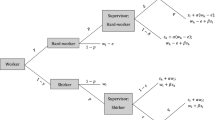Abstract
We are studying in this article an interplay between workers in organizations under the assumption that workers exhibit behavioral biases: envy, jealousy, or admiration toward the other coworkers’ compensation. We assume workers care about their relative position, and we study the impact of this assumption on their efforts and on their optimal incentive contracts. We explicitly solve for the optimal incentive contract of moral hazard a la Holmstrom and Milgrom (Econometrica 55:303–328, 1987). We model team production by agents in which each agent’s effort generates an observable signal and depends on efforts of other agents. One of the important findings is that an agent’s optimal effort is negatively impacted by the behavioral biases in other agents’ judgments. We also show envious behavior is destructive for organizations. Consistent with Tirole (Econometrica 69(1):1–35, 2001), our findings suggest that in the presence of agency problems induced by envy or jealousy, the optimal compensation exhibits high pay-for-performance sensitivity.
Similar content being viewed by others
References
Abel A.B.: Asset prices under habit formation and catching up with Joneses. Am. Econ. Rev. 80(2), 38–42 (1990)
Agell J., Lundborg P.: Theories of pay and unemployment: survey evidence from Swedish manufacturing firms. Scand. J. Econ. 97, 295–307 (1999)
Bartling, B., Von Siemens, F.: Inequity aversion and moral hazard with multiple agents. Mimeo, University of Munich (2003)
Bebchuk L.A., Fried J.M.: Executive compensation as an agency problem. J. Econ. Perspect. 17(3), 71–92 (2003)
Bewley T.: Why Rewards Don’t Fall During a Recession. Harvard University Press, Cambridge (1999)
Biel, P.R.: Inequity aversion and team incentives. Working Paper, ELSE, University College London (2002)
Blinder A., Choi D.: A shred of evidence on theories of reward stickiness. Q. J. Econ. 105, 1003–1015 (1990)
Briand P., Hu Y.: BSDE with quadratic growth and unbounded terminal value. Probab. Theory Relat. Fields 136, 604–618 (2006)
Briand, P., Lepeltier, J.P., Martin, J.S.: One-dimensional BSDE’s whose coefficient is monotonic in Y and non-lipschitz in Z. Working Paper (2005)
Campbell J., Cochrane J.: By force of habit: a consumption-based explanation of aggregate stock market behavior. J. Polit. Econ. 107, 205–251 (1999)
Campbell C.M., Kamlani K.S.: The reasons for reward rigidity: evidence from a survey of firms. Q. J. Econ. 112, 759–789 (1997)
Constantinides G.: Habit formation: a resolution of the equity premium puzzle. J. Polit. Econ. 98(3), 519–543 (1990)
Cvitanic J., Wan X., Zhang J.: Optimal compensation with hidden action and lump-sum payment in a continuous-time model. Appl. Math. Optim. 59(1), 99–146 (2009)
Demougin, D., Fluet, C.: Group vs. individual performance pay when workers are envious. CIRPE Working Paper 03-18 (2003)
Dupor B., Liu W.F.: Jealousy and equilibrium overconsumption. Am. Econ. Rev. 93(1), 423–428 (2003)
Fershtman, C., Hvide, H.K., Weiss, Y.: Cultural diversity, status concerns and the organization of work. Foerder Institute for Economic Research, Working Paper No. 4-2003 (2003)
Frank R.H.: Are workers paid their marginal products?. Am. Econ. Rev. 74(4), 549–571 (1984)
Frank R.H.: Choosing the Right Pond: Human Behavior and the Quest for Status. Oxford University Press, New York (1985)
Grund C., Sliwka D.: Envy and compassion in tournaments. J. Econ. Manag. Strategy 14, 187–207 (2003)
Holmstrom B., Milgrom P.: Aggregation and linearity in the provision of intertemporal incentives. Econometrica 55, 303–328 (1987)
Holmstrom B., Milgrom P.: Multitask principal-agent analyses: incentive contracts, asset ownership and job design. J. Law Econ. Organ. 7, 24–52 (1991)
Itoh H.: Moral hazard and other-regarding preferences. Jpn. Econ. Rev. 55, 18–45 (2004)
Jorgensen, C.B., Herby, J.: Do people care about relative income? Working Paper, University of Copenhagen (2004)
Koo H.H., Shim G., Sung J.: Optimal multi-agent performance measures for team contracts. Math. Financ. 18(4), 649–667 (2008)
Luttmer, E.: Neighbors as negatives: relative earnings and well-being. Mimeo, Kennedy School, Harvard University (2004)
MacLeod W.B.: Optimal contracting with subjective evaluation. Am. Econ. Rev. 57(2), 447–480 (2005)
Manoli, D., Sannikov, Y.: Competitive contracting and employment dynamics. Working Paper, University of California at Berkeley (2005)
Neumark D., Postlewaite A.: Relative income concerns and the rise in married womenć6s employment. J. Public Econ. 70(1), 157–183 (1998)
Prendergast C.: The provision of incentives in firms. J. Econ. Lit. 36(1), 7–63 (1999)
Sannikov Y.: A continuous-time version of the principal-agent problem. Rev. Econ. Stud. 75, 957–984 (2008)
Schattler H., Sung J.: The first-order approach to the continuous-time principal-agent problem with exponential utility. J. Econ. Theory 61, 331–371 (1993)
Sung J.: Linearity with project selection and controllable diffusion rate in continuous time principal-agent problems. RAND J. Econ. 26, 720–743 (1995)
Sung, J.: Lectures on the Theory of Contracts in Corporate Finance. University of Illinois at Chicago, preprint (2001)
Tirole J.: Corporate governance. Econometrica 69(1), 1–35 (2001)
Veccio R.P.: It’s not easy being green: jealousy and envy in the workplace. Res. Pers. Hum. Resour. Manag. 13, 201–244 (1995)
Williams, N.: On dynamic principal-agent problems in continuous time. Working Paper, UW-Madison (2009)
Author information
Authors and Affiliations
Corresponding author
Rights and permissions
About this article
Cite this article
Goukasian, L., Wan, X. Optimal incentive contracts under relative income concerns. Math Finan Econ 4, 57–86 (2010). https://doi.org/10.1007/s11579-010-0035-9
Received:
Accepted:
Published:
Issue Date:
DOI: https://doi.org/10.1007/s11579-010-0035-9
Keywords
- Multi-agent problems
- Hidden action
- Envy
- Jealousy
- Behavioral Contract Theory
- Optimal effort
- Pay-for-performance sensitivity



